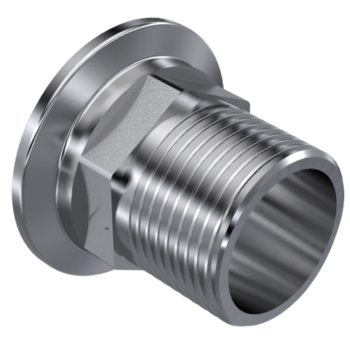ASME B16.11 Union Supplier
Threaded & Socket Weld Union Manufacturer
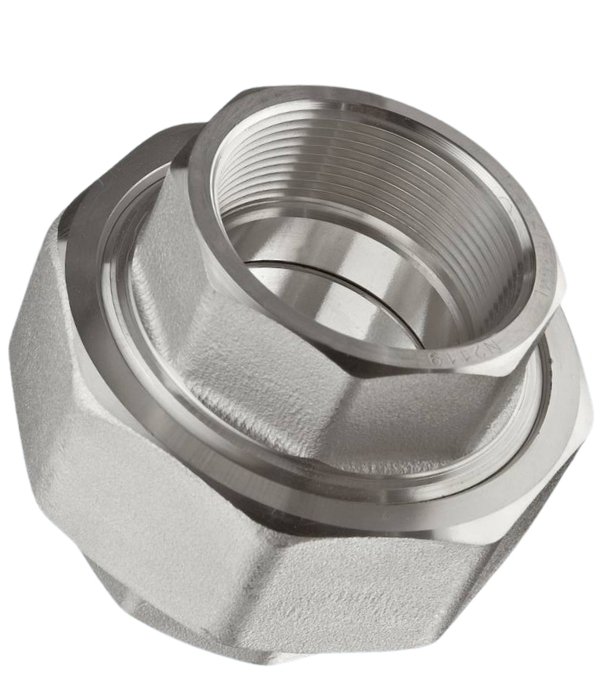
ASME B16.11 Union: Dimensions | Specifications | Material Grade | About Forged Union | All Product Types
Forged Pipe Unions are critical components used to join two pipes while allowing for future disconnection without deformation of the piping system. At Nutech Overseas, we specialize in manufacturing high-performance ASME B16.11 Forged Unions in both Threaded (NPT/BSP) and Socket Weld (SW) ends, delivering leak-proof joints for high-pressure and high-temperature applications. These forged fittings are engineered to perfection, ensuring ease of assembly and long-term reliability in industrial piping networks.
Our range of Class 3000, 6000, and 9000 Pipe Unions is manufactured from top-grade Carbon Steel, Stainless Steel, Alloy Steel, and Duplex/Super Duplex Steel, designed to meet global standards including ASME B16.11, MSS-SP-79, MSS-SP-83, BS 3799, and others. These unions are widely used in petrochemical plants, oil & gas refineries, offshore platforms, water treatment facilities, and power generation units, where a secure yet serviceable pipe joint is essential.
Forged unions are constructed in three parts—a male end, female end, and a nut, allowing for easy maintenance and alignment in the field. We offer customization in thread types, sizes from ¼” to 4”, and pressure ratings suitable for demanding conditions, ensuring compatibility with both seamless and welded piping systems. Our forged unions undergo stringent quality testing including hydrostatic, PMI, and hardness checks before dispatch.
Trusted globally, Nutech Overseas is known for on-time delivery, 100% compliance to material traceability, and bulk export-ready stock. Whether you require standard or special alloy forged unions, we deliver excellence, backed by years of experience and strong technical capabilities.
ASME B16.11 Forged Pipe Union, BS 3799 Threaded Union, MSS-SP-79 NPT Union, MSS-SP-83 Socket Weld Union, BSP Threaded Union – Available in Class 3000/6000/9000
For complete technical details, including dimensions, pressure ratings, weight charts, and material specifications of our Socket Weld and Threaded Pipe Unions, please download the full Catalog PDF below.
Durable & Service-Friendly Forged Unions in Carbon Steel, Stainless Steel, Alloy Steel, and Duplex – Ideal for Oil Refineries, Power Plants, and High-Pressure Piping Applications
Technical Specifications of ASME B16.11 Pipe Union
| Specification | Details |
|---|---|
| Product Name | Forged Pipe Union |
| Standard | ASME B16.11, ANSI B16.11, MSS-SP-79, MSS-SP-83, MSS-SP-95, MSS-SP-97, BS 3799 |
| Connection Type | Socket Weld (SW) & Threaded (NPT/BSP) |
| Size Range | ¼" to 4" (DN 6 to DN 100) |
| Pressure Class | Class 2000 / 3000 / 6000 / 9000 LBS |
| Design Type | 3-Piece Union – Male End, Female End, and Union Nut |
| Thread Types | NPT (National Pipe Thread), BSPP/BSPT (British Standard) |
| Testing & Certification | 100% Pressure Tested, PMI, IGC, NACE MR0175, MTC as per EN 10204 3.1/3.2 |
| Application Industries | Oil & Gas, Construction, Ship Building, Power Plants, Petrochemical, Pharmaceutical, Water Treatment, Automobile, Chemical, Pulp & Paper |
| Origin | Made in India (by Nutech Overseas) |
| Export Network | USA, Europe, and Middle East |
Complete Material Grade Chart - ASME B16.11 Union
| Material | Grades / Standards / UNS Numbers |
|---|---|
| Stainless Steel Union | ASTM A182 F304 / F304L, F316 / F316L, F310, F321 / F321H, F347 / F347H, SS 904L, DIN 1.4301, 1.4306, 1.4401, 1.4404 |
| Carbon Steel Union | ASTM A105, ASTM A106 Gr B, ASTM A234 WPB, ASTM A350 LF2 CL.1, MSS-SP-75 WPHY 42, WPHY 46, WPHY 52, WPHY 60, WPHY 65, WPHY 70 |
| Low Temperature Carbon Steel Union | ASTM A420 WPL3, ASTM A420 WPL6 |
| Alloy Steel Union | ASTM A182 F1, F5, F9, F11, F12, F22, F91, ASTM A234 WP1, WP5, WP9, WP11, WP22, WP91 |
| Duplex Steel Union | ASTM A815 UNS S31803, S32205, Werkstoff No. 1.4462 |
| Super Duplex Steel Union | ASTM A815 UNS S32750, S32760, S32950 |
| Nickel Alloys Union | Nickel 200 (UNS N02200), Nickel 201 (UNS N02201), Inconel 600 (UNS N06600), 601 (UNS N06601), 625 (UNS N06625), 800 (UNS N08800), 825 (UNS N08825), Monel 400 (UNS N04400), Monel K500 (UNS N05500), Hastelloy C276 (UNS N10276), Hastelloy C22 (UNS N06022), Alloy 20 (UNS N08020), Nimonic 75 / 90 |
| Copper Nickel Union | Cu-Ni 90/10 (C70600), Cu-Ni 70/30 (C71500), CuNi10Fe1Mn, CuNi30Mn1Fe |
| Titanium Union | Grade 1, Grade 2, ASTM B381 |
| Aluminium Union | ASTM B361, Aluminium 6061, 6082, 7075 |
| Brass Union | ASTM B62, C23000, C26000 |
| Bronze Union | Tin Bronze, Aluminium Bronze (C95400), Leaded Bronze (C93200), ASTM B148 |
| 254 SMO Union | UNS S31254, ASTM A182 F44 |
A forged pipe union is a precision-engineered, three-piece mechanical fitting designed to join two pipes while allowing easy disconnection and reassembly without cutting, welding, or altering the pipeline. It consists of a male end, female end, and a central nut that holds the joint together by compressing both ends to create a leak-proof seal.
Forged unions are manufactured from solid bar stock or forged blanks and machined to meet strict tolerances. These fittings are ideal for high-pressure piping systems, particularly in applications where frequent dismantling and reinstallation is required—for example, in instrumentation lines, chemical processing units, refineries, and offshore platforms.
They are available in both Socket Weld (SW) and Threaded (NPT/BSP) end connections, adhering to international standards like ASME B16.11, BS 3799, MSS-SP-83, and MSS-SP-79.
Forged pipe unions are preferred over standard couplings in systems that demand:
- Quick access for maintenance or inspection
- High mechanical strength and corrosion resistance
- Reliable sealing in high-pressure and high-temperature environments
Depending on the service conditions, these unions are made from a wide variety of materials including carbon steel, stainless steel, alloy steel, duplex/super duplex, nickel alloys, and copper-nickel, offering long-term performance and safety in demanding industrial operations.
Quality control begins at the raw material stage and continues through every phase of production to ensure that each forged pipe union meets the highest standards of dimensional accuracy, pressure integrity, and durability. All unions are manufactured as per ASME B16.11, BS 3799, and MSS-SP-83 specifications, ensuring consistency with global industrial requirements.
Our quality assurance process includes:
- Positive Material Identification (PMI) for chemical composition verification
- Ultrasonic Testing (UT) and Magnetic Particle Inspection (MPI) for surface and sub-surface defect detection
- Hydrostatic Pressure Testing to verify leak-tightness under working and test pressure ratings
- Dimensional Inspection using calibrated instruments to ensure tight manufacturing tolerances
- Visual and Surface Finish Inspection under controlled lighting conditions under controlled lighting conditions
All forged unions are accompanied by complete documentation and certification, including:
- EN 10204 3.1 Mill Test Certificates
- NACE MR0175 / MR0103 Compliance for sour service applications
- IBR Certification for use in Indian boilers and piping systems (where applicable)
- CE Marking for compliance with European Pressure Equipment Directive (PED)
We prioritize both product integrity and logistical efficiency when it comes to packaging and global delivery of ASME B16.11 Forged Pipe Unions. Our packaging solutions are designed to prevent any risk of mechanical damage, corrosion, or contamination during transit and long-term storage.
Packaging Highlights:
- Small-size forged unions (¼” to 2”) are packed in high-density polyethylene (HDPE) sealed bags or poly-wrapped bundles, ensuring dust-free and moisture-protected handling.
- Larger sizes and heavy unions are placed in custom-built, fumigated wooden crates or plywood boxes, with each item wrapped in anti-corrosive VCI film or oiled kraft paper.
- Heat numbers, material grades, pressure ratings, size, and quantity are clearly labeled on every package for easy traceability.
- For special alloy materials (Duplex, Super Duplex, Inconel, etc.), individual marking and soft foam padding are used to prevent surface abrasion or pitting.
- Export packaging complies with ISPM-15 standards for wooden materials, ensuring customs clearance across all international ports.
Delivery Options:
- We offer FOB, CIF based on customer preference and port of delivery.
- Orders are shipped via sea, air, or courier freight, depending on urgency and volume.
- Our strategic inventory and partner logistics network ensure fast dispatch times, typically ranging from 3 to 15 working days, based on order size and material availability.
We routinely export forged pipe unions to critical sectors such as oil & gas terminals, petrochemical facilities, LNG units, desalination plants, and power generation sites, ensuring on-time delivery and compliance with client-specific packing protocols.
Unions come in different types to accommodate various piping system requirements, installation methods, and pressure classes. At Nutech Overseas, we manufacture and supply the following key types of forged unions to meet diverse industrial needs:
- Socket Weld Forged Union:
This type features a socket weld end on both sides, where the pipe is inserted into a recessed area of the fitting and then welded around the joint. Socket weld unions provide excellent structural integrity and leak resistance, making them ideal for high-pressure and high-temperature applications in critical systems such as chemical plants, power generation, and hydraulic lines.
- Threaded (NPT/BSP) Forged Union:
Threaded unions use tapered threads (NPT or BSP) on the ends to join pipes without welding. These unions are widely preferred in low to medium pressure systems, especially where ease of assembly and disassembly is important, such as instrumentation lines, water treatment, and compressed air systems. They provide a secure mechanical connection but are limited to pressures defined by the thread and material strength.
- Combination Unions:
In some cases, forged unions may have one end threaded and the other socket welded to facilitate connections between different types of pipe joints within the same system, enhancing versatility.
- Special Material Variants:
Forged unions are also produced in specialized materials like Duplex & Super Duplex Stainless Steel, Inconel, Alloy Steel, and Copper Nickel to serve corrosive or extreme temperature environments.
Unions are in high demand worldwide, especially in regions with heavy oil and gas, petrochemical, and industrial activities. The major export markets include the United States, where stringent ASME standards are a prerequisite for refinery and pipeline projects. European countries such as Germany, Spain, and the UK rely on high-quality forged unions for their advanced manufacturing and energy sectors.
The Middle East remains a key consumer, with countries like Saudi Arabia, UAE, and Qatar utilizing these fittings extensively in oil exploration, petrochemical plants, and power projects. In Southeast Asia, nations including Singapore, Malaysia, and Indonesia incorporate forged unions in LNG terminals and chemical industries.
African markets such as Nigeria, South Africa, and Egypt are increasingly adopting forged pipe unions for expanding energy and water infrastructure projects. Additionally, Australia and New Zealand use these fittings in mining and offshore operations, while South American countries like Brazil and Argentina rely on them for oil and chemical processing industries.
This global presence reflects the growing preference for durable, high-pressure rated forged unions that comply with international standards and meet rigorous performance criteria.
Forged steel union offer significant benefits in systems where high pressure and temperature resistance are essential. Their robust construction ensures leak-proof joints, even under mechanical stress or thermal expansion. Unlike welded joints, unions can be disassembled without cutting the pipe, which simplifies routine maintenance, inspection, or part replacement. Additionally, they ensure excellent mechanical strength and fatigue resistance due to the forging process, making them ideal for critical installations in refineries, offshore rigs, and chemical plants.
The choice depends on the specific application and pressure rating. Threaded unions are preferred in systems where welding is not feasible or when frequent disassembly is needed, such as in low- to medium-pressure utility lines and instrumentation piping. On the other hand, socket weld unions provide stronger, permanent joints and are better suited for high-pressure and high-temperature applications, like steam pipelines or hydraulic systems. It’s crucial to consider factors such as fluid type, service conditions, pressure class, and code compliance when selecting the appropriate type.
Browse The Products
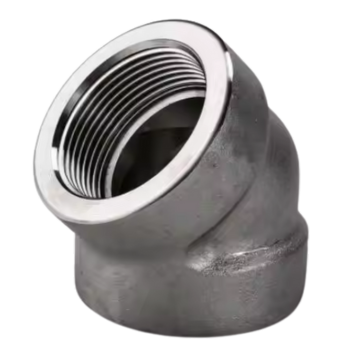
Forged Fittings
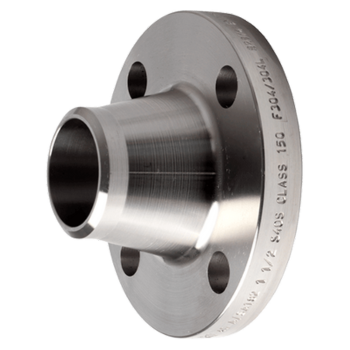
Flanges
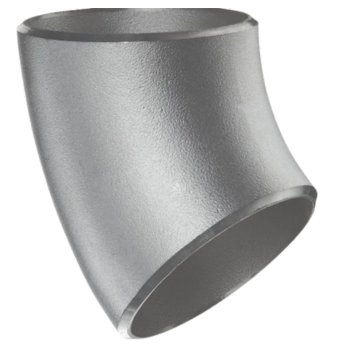
Buttweld Fittings
